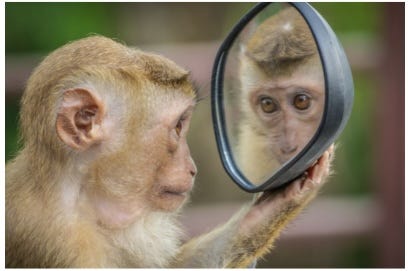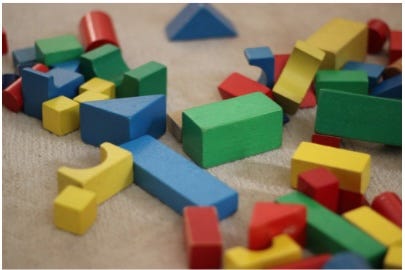Had We But World Enough and Time
To His Coy Monkey
Hello Friends,
Big news this week! Monkeys ain't writing no stinking Shakespeare.
Well, one of the theories we could always hang our hat on was The Infinite Monkey Theory. Basically, it says: With enough time and enough monkeys, one of those little guys would bang out the complete works of William Shakespeare.
It's a thought experiment, like Schrodinger's Cat. You, know, the morbid cat in a box with a bottle of poison gas question.
Almost There
Truthfully, I have been suspicious of the Infinite Monkey Theory.
Whenever I consider it, and it's surprising how much I do consider it, I grow sad, thinking about that one disappointed simian who missed it by one letter. Imagine, randomly typing thousands of letters, the near perfect Complete Works of William Shakespeare, only to have banged out: "To be or snot to be."
And, for you all who were also suspicious of those tapping monkeys, we now have a mathematical proof that our instincts were true. Two monkey-hating Australian statisticians have given us a formula:
Their calculations were based on a monkey spending about 30 years typing one key a second at a keyboard with 30 keys – the letters of the English language plus some common punctuation. It found that the time it would take for a typing monkey to replicate Shakespeare’s works would be longer than the lifespan of our universe.
And, their conclusions come from more delightful news:
The point is that monkeys wouldn’t have an infinite amount of time to type out Shakespeare’s complete works. That’s because the universe is predicted to end in about 10100 years – that’s a 1 with 100 zeroes after it.
Not only did they ruin one of the most optimistic theories in science, but they did it by reminding us that everything is going to end some day.
Which leads me to another one of my favorite topics—Entropy.
Things Fall Apart
Entropy is a measure of disorganization. I think it is best represented by a coffee cup having been knocked to the ground by a devious cat, perhaps an angry cat who has been locked in a box all day.
Before the mug fell, it was whole, probably full of hot delicious coffee. Then once knocked to the nice, clean floor, it shatters, creating a coffee pond and pieces of busted mug.
This is the tendency of things in the world—over time, they decay.
It takes energy to produce a thing: a potter makes the cup, paints it, and puts it in a kiln (which also uses heat to harden it). You take the cup and put it on the counter. When your favorite feline friend slides it silently off the edge of the counter, it falls (converting the potential energy in the cup into kinetic energy with the force of gravity) and shatters, releasing noise (sound energy) and breaking molecular bonds in the clay and cooling the whole thing slightly (releasing more energy).
This happens in the dimension of time. In our universe, cups shatter as time moves forward. You never see a shattered cup and puddle of coffee randomly reassemble themselves into a whole mug of joe. You never see that old 2006 Honda Civic, without the influx of energy, grow shiny and new as it sits in your driveway.
The condition of this movement—whole stuff becoming disorganized pieces, releasing energy on the way over time—is entropy (kinda, there is some physics and math in there). And, it's what leads many scientists to believe that eventually, at the end of time, the entire universe will be disassembled in to microscopic dust.
We can blame cats for a lot of it.
And, speaking of physics and cats
One very crafty scientist created an equation of cat motion to teach physics to students.
The universe is a vast and mysterious place.
Happy reading and writing.
David




